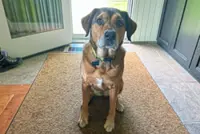The first time I took a pet to the vet here in Malaysia, I was roped in to help with the operation. Standing over my unconscious kitty, staring straight into his insides, was a bit of a challenge. Admittedly, that was 25 years ago.
Today we live in the city, and two out of our three favourite vets have assistants. So, I drop off my pets and collect them an hour or two later. But when I visit a smaller practice, helping out is routine.





